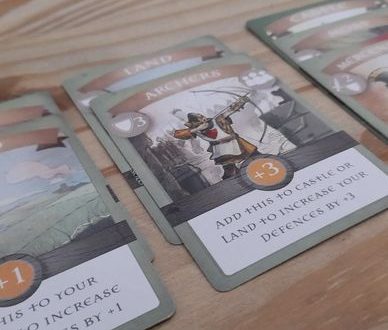Kickstarter……Gamefound……..crowdfunding to get games (and practically every other consumable) from idea to inception is now as much a part of our hobby as meeples, dice, and drafting.
But what seems to have started out as a platform to help the “little guys” get cardboard concepts off the ground without a corporate financial and support injection, has fast become a go-to way to get games released for designers and publishers regardless of scale.
Everybody, no matter their size, is pledging their bets. The old model of produce and pray for profit is out. The internet generation has engineered a new dawn. An age where publication depends entirely on early consumer commitment. On trust. A promise to pay before a single component has rolled off the production line.
Risk v reward is now a dilemma faced by purchasers, not publishers. Including those which could comfortably stomach the hit of a less popular release.
But this piece isn’t a detailed discourse on the morality of crowdfunding by the big publishers, nor a musing on the expectations (reasonable or otherwise) of project backers – although these topics I will return to, I promise, as they raise interesting issues.
Rather, this is a short reflection on another aspect of social funding models which only occurred to me this week.
You see, a few months ago, I was approached by a designer to review a game that was launching on Kickstarter. My excitement at being asked to do my first KS preview got my giddy fingers tapping out an acceptance before my brain had registered what this would or could mean.
But it means a lot. A lot to the designer. A lot to the potential backers. A lot to me.
Passion Projects
In a normal review situation, the task is fairly straightforward for any reviewer; receive the finished game, play the game (a lot!), reflect upon the game play, and produce a written and/or video account of the experience in your own style. A warts and all breakdown that other gamers can (hopefully!) enjoy as one view amongst a number of others. Each creator picking up on different aspects of that game in a way which is personal to them. Together helping to build a bigger picture for players.
I love it. I love the process of deep diving into a game and working out what I like and what doesn’t quite work for me, my family and/or my own game group. I love putting my experiences into words and pictures as a combination of creative expression and visual diary. I love projecting into the shoes of other players and anticipating what might or might not appeal to them based on my own encounters. Because that feeling of finding a game that you love, that you get, that gets you, that makes you feel like you belong in our hobby, is priceless.
At its core, I love helping other people find their next game.
And, of course, sometimes that means that my review will put somebody off a game rather than draw them in to it. It will highlight something that isn’t going to click with them or enthuse them enough to go and buy or even try. But that is ok. That means my review is working. That means my review has integrity.
Responsible Writing
No reviewer ever wants to lead players towards games that aren’t going to be right for them. Fluff piece panegyrics full of false promises and misleading information backfire spectacularly on the player, publisher, designer and the content creator themselves. At best they are pointless. At their worst, however, they are damaging to the respect and sincerity upon which our fantastic community rests.
And so, with that in mind, it is my belief that all reviews should be a balanced mix of factual information and subjective opinion. I hold myself up to this standard every time I am sent a game or take it upon myself to review one from my own collection.
But, what about the situation where the reviewer is the only person with a copy of a particular game? A prototype which will become a reality and fill a space on shelves only if it receives a little (or a lot of) help from players prepared to take a punt on a game about which they have nothing to go on but the reviewer’s word?
Granted, the crowdfunding campaign page is the first stop; replete with photos and descriptions of components, mechanisms, rules, and themes. But many Kickstarter and other community funded projects, which could prove to be fantastic games, often ultimately fall short because of a failure to promote themselves.
Some of the accountability is therefore shared with the web design, but what else does a potential backer have to reassure themselves with when deciding whether to commit? What or who can they look to in order to decide whether a concept is interesting or attractive enough for them to get involved as an investor? What will make them want that game enough to help it reach its funding goal and actually hit retail? What can they rely on? Instinct? Gut feeling? Blind faith? The answer is simple. The pre-review. Nothing more. Nothing less.
And the weight of that responsibility took me by surprise as I looked at my screen, preparing to put my thoughts on this previously untried and untested game onto paper. My mind spiraled. It struck me that if I do a bad job or even just a mediocre job, this game might not fund. No game. Period. The designer might not see their dream realised. The backers might never see the game appear in their collections. No pressure………
Candid Concepts
On that basis, when reviewing a prototype, I feel an added layer of complexity threaded between the words. Not a loyalty which influences my opinion as to whether I have enjoyed the game play or not. Nor an obligation which persuades me to recommend the game regardless of its shortcomings. But rather a need to make clear to readers and viewers that it is still, in a big way, just a concept, and any observations are therefore subject to refinement and change. A box of potential.
As a result, preview reviews fall heavier on anticipation and projection than an analysis of set-in-stone game play. After all, the designer is at liberty to make as many tweaks, changes, and full on re-thinks as they want or need before those boxes wing their way into backers’ homes. Thanks to a mind bendingly complex network of global fulfillment partners, not forgetting.
But please don’t think that this is an exercise in ego on my part. I am conscious that my word is definitely not gospel, and nor should it ever be treated as such. I am not even a legend in my own mind, let alone somebody who considers their opinion to be the final word on a subject.
And perhaps my extra sense of duty towards designers and publishers at the crowdfunding stage is simply a direct result of my anxiety dragon breathing down nervous fire. Maybe it is something that other content creators do not feel. I don’t know and I can’t say. But I do know that I write from my own personal experiences, my own context, my own sphere. And in the same way that my subjectivity colours what could otherwise be a very dry re-hashing of a draft rule book, it also makes my thoughts as a gamer, and as a person, more relatable when gamers are looking to trust a project enough to pledge money with no guarantee of return.
True Connections
To me, connecting with a person or understanding a situation often means finding something in them that resonates with my own human experience. A mechanism in my mind that helps me to process information and react appropriately to it. Not a means to diminish another person’s own experience and never to make it all about mine. But simply as a tool to help reach across and share something with somebody in a way that resonates with them.
As such, whether evaluating something novel or a well-loved, well-known game, that is what I try to achieve in all of my own reviews. And maybe, just maybe, feeling that extra weight of responsibility on my shoulders is precisely what helps me to know that I am not falling below the standards my readers and viewers deserve.


